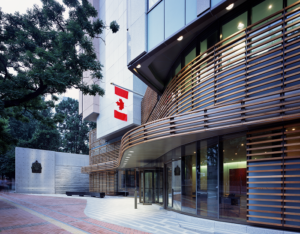Ken Wounggeun Oh is a Commercial Officer for the Ontario Trade and Investment Office within the Embassy of Canada to Korea. He graduated with his Bachelor's in Environmental Studies (BES) in June 2012.
Where do you work and what do you do?
Currently, I am working as a Commercial Officer for the Ontario Trade and Investment Office within the Embassy of Canada to Korea. As a Commercial Officer, I help develop and implement strategies to increase economic activity in Ontario through investment attraction, trade opportunities, and research and innovation partnerships.
Tell us your work journey after the degree: what went well, what was challenging?
Upon graduation, I pursued a career in law enforcement. This is because I had always felt that my community could be better represented. After two years, however, an unfortunate event in my family followed, and I had to return to my home country – South Korea. Within the first two weeks of my return to Korea, I was lucky enough to start my professional career as a Research Assistant at Korea Advanced Institute of Science and Technology (KAIST), the top university in Korea in terms of science and technology. I was assigned to a government-funded technology commercialization project between KAIST-University of Texas, Austin. After a year, I moved onto a different commercialization project funded by the Korean federal government and worked in Washington DC for 4 years. As my professional experience advanced, I felt I was ready for a Commercial Officer position at the Embassy of Canada to Korea, which aligns well with the skill sets that I had developed throughout my professional career.
When looking back, the biggest challenge at the beginning of my career was uncertainty about the future. The job market is extremely competitive here in Korea, just like elsewhere in the world these days. I was not sure how to develop my professional skills and become competitive in the job market. What is worse, I was not even sure whether I am capable of being competitive. Fortunately, I had a group of great colleagues that are extremely wise and ready to help.
How did you use what you learned; when did you feel - "why didnt they teach me about this"??
I found that a writing skill is still very important in the work environment even in the 21st century. Numerous (and notorious) assignments (i.e. research paper) in university were helpful in terms of developing critical thinking and writing skills. On the other hand, the skill set that I wish I could have learned before graduation was a briefing and reporting skill (both writing and speaking) and Microsoft Excel.
Thinking back to when you were in high school, what made you want to get into this? How does what you are doing match, and differ, from what you thought?
Back in high school, I would never have thought of working in the public sector. I wanted to become a musician, and my friends and family still make jokes about my past. It was the career path that naturally led me to where I am after graduation. It seems unrelated and uncertain at the beginning of a career journey. However, it becomes more clear as your experience and perspective develops. This takes time, energy, and continuous efforts.
Any other advice for people thinking of an undergrad environmental degree?
Speaking from my humble experience, if you’d like to pursue a career in the environment sector (or any sector), I would recommend completing a Master’s Degree. Bachelor’s degree is almost treated as a driver’s license in the job market these days, and many employers would prefer hiring a more sophisticated candidate. Remember, there could be hundreds of candidates competing for one position and that is the reality.


